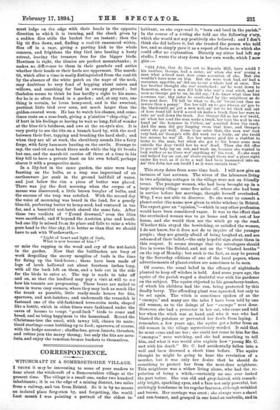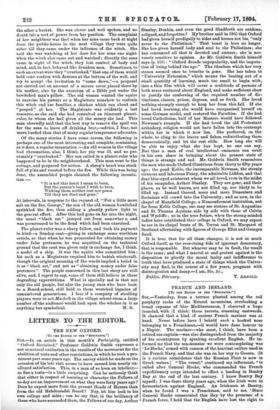CORRESPONDENCE.
WITCHCRAFT IN A. SOMERSETSHIRE VILLAGE.
I TRIM{ it may be interesting to some of your readers to hear about the witchcraft of a Somersetshire village at the -present time. The village is a small one, under two hundred inhabitants; it is on the edge of a mining district, two miles from a railway, and ten from Bristol. So it is by no means an isolated place forgotten by, and forgetting, the world. Last month I was painting a portrait of the oldest in-
habitant, as she expr..sied it, "born and bred in the parish." In the course of a sitting she told me the following s'ory, which she would not say positively she believed; and I don't think she did believe it, but she trusted the person who told her, and so simply gave it as a report of facts as to which she could offer no explanation. Directly my sitter had left my
studio, I wrote the story down in her own words, which I now. give "Old John, that do live out to Knowle Hill, have a-told I his vaether, George, had a sister, an' when she wer' young a man what a-lived next door come a-courten of she. But she wouldn't have none on him. But she were took bad, an' had a raveunen appetite, an' did use to eat a whole loaf at once. Zoo her brother thought she wee overlooked ; an' he went down to Somerton, where a man did bide who wer' a real witch, and zo zoon as George got to am, he did ray, 'I do knew what thee hist a-cwome var ; thy zister be overlooked by the neighbour as do live next door. I'll tell 'ee what to do, an' twont cost thee no mwore than a penny.' Zoo her told un to goo whoa.m an' goo to the blacksmith an' get a new nail, an' not to let thick nail out of hers hand till heed a-zeed un make a track, then her were to take an' nail down the track. Zoo George did as her war' twold, an' when her zeed the man make a track, her took the nail in one band an' the hammer in t'other, an' a-nailed down the track. And the man did goo limping vrom that time, and George's sister she got well. Zome time arter that, the man wer' took very bad, an' George's wife did work vor a leitdy, an' she twold her missus he wer' ill. Zoo her miasus gied her a rhabbnt to teitke to the man, but when she got to his house some men outzide the door twold her he wer' dead. Then she did offer to goo an' help Jay un out, and wash un, because she wanted to look wether or no there wer' anything wi' his root. Z a she went and helped lay un out, an' zhure enough there wer' a place right under his root, as if zo be a nail had been hammered into nu. An' this John her son twold I as it were certain true."
This story dates from some time back. I will now give an instance of last autumn. The wives of the labourers living in two adjoining cottages in the village were not on friendly terms. The younger woman, who had been brought up in a large mining village some five miles or, where she had been in service before her marriage, thought herself overlooked.
Why, I was not able to discover. So she went to consult a planet-ruler (the name now given to white witches) in Bristol.
The expert gave an "opinion,"—which in any other profession would have been considered vague. It was to the effect that the overlooked woman was to go home and look out of her
home, and she would then see the witch go up the road. Whether this stayed the bewitching, or satisfied the woman, I do not know, for it does not do to inquire of the younger people; they are greatly afraid of being laughed at, and are
ashamed-of their belief,—the only hopeful sign about them in this respect. It seems strange that the astrologers should live in towns like Bristol, and not on the "blasted heaths" on the tap of Mendip; but such is the fact, as may be proved by the Saturday editions of one of the local papers, where advertisements of planet-rulers are sometimes to be seen.
Of course, the usual belief in the efficacy of nightshade planted to keep off witches is held. And some years ago, the squire of the parish waged a doubtful war with his gardener on the subject. The squire objected to his gooseberry-buehes, of which his children had the run, being protected by this deadly berry. The offending plant was uprooted, but only to be set again. The witch is sometimes spoken of as the " enemye," and many are the tales I have been told by one old woman, as to the doings of her " enemye" next door. However, she had a protector in her cat, who came and told her when the witch was at hand, and who it was who had blasted the potatoes or prevented her fowls from laying. I
remember, a few years ago, the squire got a letter from an old woman in the village mysteriously worded. It said that
he must come and see her ; she could not come to him for the " enemyes" were watching, and she had something to tell him, and what it was would also explain how "young Mr. C.
met with his death." Mr. C. had accidentally fallen into a, well and been drowned a short time before. The squire thought he might be going to hear the revelation of a murder, bat it was only her desire that he should do something to protect her from the next-door neighbour. This neighbour was a widow living alone, who had the re- putation of being a witch,—certainly no one ever looked the part better. She was old and grey-haired, with remark-
ably bright, sparkling eyes, and a face not only powerful, but strikingly handsome in its regular features, although wrinkled and brown. Her carriage was erect ; she always wore a shawl and sun-bonnet, and grasped in one hand an umbrella, wain.
the other a basket. She was clever and well spoken, and no doubt felt a sort of power from her position. The complaint of her neighbour was that when her sons came back at night from the public-house in the next village they were quite sober till they came under the influence of the witch. She said she was watching at her door for her sons one night, when the witch also came out and watched; directly the sons came in sight of the witch, they lost control of body and mind, and, in fact, behaved like drunken men. Sometimes, to such an extent were they "overlooked," that one of them would hold conv-rsation with demons at the bottom of the well, and try to accept the invitation to "come down,"—a proposal not carried out on account of a secure cover placed there by his mother, also by the exorcism of a Bible put under the bewitched man's pillow. The old woman wanted the squire to exercise his powers as a Magistrate somehow to restrain this witch and her familiar, a chicken which ran about and "peeped" at her. The Magistrate was evidently a last resource, as she said she had consulted an itinerant planet.
ruler, to whom she had given all the money she had. This man shrewdly said that the best way to remove the spell was for the sons to leave off drinking beer,—advice, I fear, not more heeded than that of many regular temperance advocates.
Of the many stories I have come across, the following is perhaps one of the most interesting and complete, containing, as it does, a regular incantation :—An old woman in the village had rheumatism, also, I think, her pig was ill, and so pre- sumably "overlooked." Her son called in a planet-ruler who happened to be in the neighbourhood. This man went to the cottage, and prepared for action. A sheep's heart was stuck fall of pins and roasted before the fire. While this was being done, the assembled people chanted the following incanta- tion :— " It is not this heart I mean to burn, But the person's heart I wish to turn, Wishing them neither rest nor peace Till they are dead and gone."
At intervals, in response to the request of, "Put a little more salt on the fire, George," the son of the old woman bewitched sprinkled the fire, thus adding a ghastly yellow light to the general effect. After this had gone on far into the night, the usual "black cat" jumped out from somewher e, and was pronounced to be the fiend which had been exorcised.
The planet-ruler was a sharp fellow, and took his payment in kind—a Sunday coat—giving in exchange some worthless article, so that when he was prosecuted for obtaining money under false pretences, he was acquitted on the technical ground that the coat was given only in exchange for, I think, a model of a ship. It was the squire who committed him ; his oath as a Magistrate required him to banish witchcraft, though the original meaning of the words implied a belief in it as "black art," and not as "obtaining money under false pretences." The people concerned in this last story are still alive, and, I regret to say, some of them still believe in these degrading superstitions. What is specially sad is that not only the old people, but also the young ones who have been to a Board-school, still hold to these wretched legacies of unnumbered generations. I fear if a company of strolling players were to act Araebeth in the village school-room, a large number of the audience would look upon the witches in it as







































 Previous page
Previous page